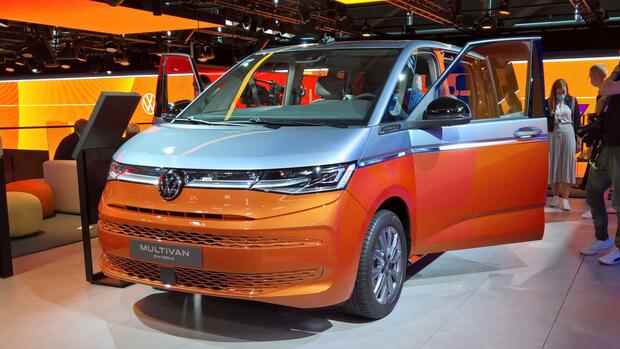Volkswagen T7 as a plug-in hybrid: The new semi-electric minibus from the Wolfsburg car manufacturer is also subject to the current new recall due to a possible fire hazard.
(Photo: imago images/Manfred Segerer)
Dusseldorf Risk of fire with plug-in hybrids from the Volkswagen Group: As the company confirmed on Thursday, almost 120,000 vehicles are therefore called into the workshops. In addition to the core brand Volkswagen passenger cars, cars from Audi, Skoda and Seat are affected. A short circuit in the vicinity of the battery could lead to a vehicle fire. The Federal Motor Transport Authority (KBA) in Flensburg has also become involved as a supervisory authority.
“A fuse in the drive system of some plug-in hybrid vehicles can have defects in individual cases,” confirmed a VW spokesman. In the worst case, it is possible that this fuse does not work properly in the event of an overvoltage (short circuit). According to VW information, there has been one proven case in which such a short circuit led to a fire in a plug-in hybrid (PHEV). The group has more than 300,000 PHEV vehicles on the road worldwide.
In Germany, almost 26,000 vehicles from the Volkswagen brand have to go to the workshop because of the potential risk of fire. There are a good 42,000 VW vehicles worldwide. The Arteon, Passat, Golf, Tiguan and Transporter T7 models are affected from the years of construction 2019 to 2022. Audi has to recall almost 25,000 cars worldwide.
The repair in the workshop is comparatively easy and quick. As the KBA also announced, “an additional protective insulating mat will be attached over the switch box of the high-voltage battery” to the affected vehicles. The insulating mat consists of a heat-resistant textile-glass mixture, which eliminates the potential hazard.
Top jobs of the day
Find the best jobs now and
be notified by email.
Volkswagen emphasized that the actual risk of fire is low. In an affected vehicle, there must actually be a short circuit, and at the same time the fuse must also be defective. The probability that both events will occur one after the other is very low. “This is a precautionary recall in the service of safety,” added the VW spokesman.
Ford and BMW have also had to recall PHEVs
Volkswagen isn’t the first German automaker to have problems with its electric and semi-electric vehicles. At the end of 2020, Ford Europe and BMW were hit, but with fewer units than the VW Group is now. At Ford, a good 30,000 plug-in hybrids had to go to the workshop because of a possible fire hazard, at BMW there were around 27,000 vehicles. Dirty batteries were the cause.
Ford incurred costs in the three-digit million range because the batteries had to be completely replaced at the time. For Ford Europe, this meant an enormous technical and logistical effort that had never existed in this form before in the automotive industry. Technicians in the workshops had to be prepared for the battery change, and Ford had to guarantee the safe transport of more than 30,000 new battery packs.
Even if there are about four times as many cars, the Volkswagen Group should get away with it much cheaper. Installing an additional insulating mat is minimal intervention compared to replacing the high-voltage battery completely, which costs several thousand euros in a plug-in hybrid.
More: Ford found the bug in the Kuga
